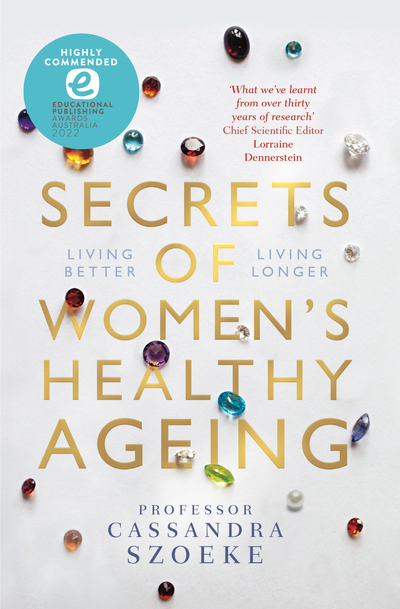Women's healthy ageing
WHAP Science Advisory Committee
- Prof Cassandra Szoeke
- A/Prof Joanne Enticott
- Prof Helena Teede
- A/Prof Amanda Vincent
- Prof Dennerstein
- Prof Hopper
- Dr Campbell
- Dr Hua
Community Links
Our aim is to improve women’s health and wellbeing across the lifespan.
About the Research
We are working to identify new treatments and management across women’s lifespan (including reproductive health) to improve women’s health & wellbeing.
We are working towards obtaining crucial datasets across the three decades when chronic diseases develop before they are diagnosed to:
- Identify sex-specific risk factors and therapeutic targets and validate these in larger populations
- Examine sex differences to refine sex-specific early identification, prevention and management.
Sex specific medicine education of health professionals and community
We have developed a sex-specific medicine course for continuing medical education and integration into medical school current programs. We plan to upscale this course to other specialist training colleges in addition to other health professionals and together with community partners create a community education course with these highest levels of evidence.
There is a well known absence of research on women. Most studies were conducted in men, until the 2000 NIH mandate to include women in all registered clinical trials. It was only in 2015 that the NIH mandated that females be included in animal studies also. That’s less than a decade of information on female specific information. Yet in this short time we have already found that medications have different impact in women compared to men and that the signs, symptoms, treatment and prevention strategies for heart disease are entirely different in women compared to men. Today ABS shows that women over age 50 are 3.7 times more likely to suffer “severe disability limiting activities of daily living” than men of the same age. So whilst women live 3-4 years longer, these are not happy years. Our program targets improving health for all women.
Mean age of menopause is 51 years of age, most studies of the transition stop when women reached postmenopause. Healthy Ageing and Cognitive Studies commence with cohorts older than 65 years of age due to the low prevalence of disease under 70. Therefore, there is almost no information about postmenopause. However, women now live almost half their lives in postmenopause!
Gaps we target
We target the leading causes of death and disease burden in women published by AIHW & ABS
- Limited data on women where the biological basis of disease is different
- Absence of long-term studies when chronic disease is known to develop over 20 to 30 years
- Lack of data on midlife hormonal profiles and later life
- Lack of sex–specific early detection and management tools, education or guidelines.
An important part of our discovery work is from the longest ongoing study of Women’s health in Australia (The Women’s Healthy Ageing Project, est 1990).
In addition to being the longest, it is also unique in its high retention over three decades and detailed information, with all women completing detailed menstrual diaries across their transition in addition to fasting biomarkers including vascular risk markers and hormonal assays alongside clinically validated cognitive and psychological testing as well as imaging and genetic data.

We aim to address the enormous disparity in the sex specific burden of bone and muscle disease. Through identifying preventive factors for these diseases our target is to stop progression of these chronic diseases before there is any impact to function.
Leveraging the largest cohort serially sampled (45 to 87yoa) globally with serum hormones, biomarkers including for amyloid, detailed reproductive and menopausal transition data, hormone therapy (HT) type/ duration, full neurocognitive profiles and imaging, we are uniquely positioned to study mechanisms, risks and early detection.
This program will obtain pathological cognitive trajectories, known to only occur over 70, creating what, to our knowledge, would be the first longitudinal prospective study to cover the entire 30 year prodrome of AD, which includes biobank, clinical, physical, state of the art hormonal, lifestyle, vascular risk alongside neuropsychiatric evaluations and specialised AD biomarkers, including imaging. Supported by linkage to MBS/PBS and validated in large population sampled, internationally collaborative studies with harmonised measures, which will allow development of risk modification tools and early identification of those at risk
We would have to wait decades for other studies or RCT to accrue such valuable 30-year data. The long term impact of this program is enormous given the estimated 66% of women currently in midlife who are expected to develop AD in the next decades
We aim to address female-specific gaps on CVD mechanisms, natural history, risk prediction and perception and on innovative digital tools for screening and preventative behaviours. We then aim to implement this sex and gender tailored knowledge via current/ new digital tools, clinical pathways and guidelines to prevent in heart disease, stroke and neurovascular pathology.
Natural history, mechanisms and risks: Biological differences in hormones and sex-specific risk factors in women are known to contribute to unique pathophysiology3 with recent calls for sex-specific guidelines.4
Of the more than 40 symptoms experienced at Menopause in fact Aches and Joint pains are the MOST COMMONLY REPORTED. These are also in the top 4 leading causes of disability in women (see above Back pain and problems). It is well known that osteoporosis and osteoarthritis are far more common in women, than men. Falls and Balance issues cause an enormous burden of disability, disease and death each year.
Current projects
- Women’s Healthy Ageing – time to shift from bikini to a holistic model of women’s health.
- Physical Activity from midlife to late life and its impact on neurodegeneration
- The relationship between female-specific vascular Risk Factors and cerebral white matter damage in women across 25 years.
- Workplace health issues reported by women to their health insurers
- Sex-Specific Differences in Health
- CME program on sex-specific differences in health (RACP)
- Medical School implementation of sex-specific teaching.
- Healthy Hearts & Minds
- Mental Health & Cognition. Top disease burden in women include dementia and mental health which are strongly related, as per our recent work showing depression relates to dementia pathology. With absence of longitudinal prospective studies with parallel follow-up of mood and cognition, its unclear if mental health is a risk or an early dementia symptom, limiting clinical management.
- Physical Health after Violence
- Impact of Violence on women’s later life health (Comorbidity and HealthCare Utilisation) The long-term effects of intimate partner violence (IPV) on physical health outcomes and health-related behaviours are under-researched in comparison to the effects on mental health and pregnancy. Our recent review highlights significant gaps in this field of research, particularly in relation to cardiovascular disease, endocrine dysfunction, and neurological symptoms and conditions. It demonstrates a need for additional long-term studies in this field to better inform the health care of women who have experienced IPV and to establish the physiological mediators of these outcomes.
Collaborations
International Brain Health Registry
Our partnership with the Brain Health Registry allows the country comparison of changes in cognition over time. The BHR cognition test is provided alongside our lifestyle and health questionnaire to allow for the most comprehensive data on ageing and brain health.
Global Burden of Dementia
Our principal investigator is part of the Global Burden of Disease Neurology team. Taking clinical lead on the increasing prevalence of dementia.
Study of Women Across the Nation
The study of women across the nation is a sister study of the Womens Healthy Ageing Project since the 90s. Includes the international guidelines for women’s health: Study of Women’s Health Across the Nation
Falls and Neurocognitive Disorders: Two Interconnected Geriatric Syndromes (MDAP collaboration)
Falls are a significant cause of injuries, loss of confidence, increased morbidity, and institutionalisation in all older people, but particularly those with dementia. WHAP teamed up with other international cohorts to compare data on musculoskeletal and cognitive variables that could optimise the ability to predict and prevent falls in this age group.
AIHW-UoM Study– Healthcare Utilisation
An agreement the Australian Institute of Health and Welfare that enriches WHAP by allowing access to a number of state and national data repositories to complement data collected by the study. Allowing for the determination of the impact of various clinical, pharmacological and other factors on cognitive decline and healthy ageing in women.
LIFEPOOL
A joint VCCC – HAP and School of Public Health UoM collaboration focused on Women’s Health. Lifepool’s collaboration with WHAP has seen introduction of annual follow-ups including specialised validated tests of cognition and mood.
Funding
Funding for the Program has been provided by the National Health and Medical Research Council (NHMRC Grants 547600, 1032350 & 1062133), Ramaciotti Foundation, Australian Healthy Ageing Organisation, the Brain Foundation, the Alzheimer’s Association (NIA320312), Australian Menopausal Society, Bayer Healthcare, Shepherd Foundation, Scobie and Claire Mackinnon Foundation, Collier Trust Fund, J.O. & J.R. Wicking Trust, Mason Foundation and the Alzheimer’s Association of Australia and Royal Australian College of Physicians. Inaugural funding was provided by VicHealth and the NHMRC. The Principal Investigator (Cassandra Szoeke) is supported by the National Health and Medical Research Council.

